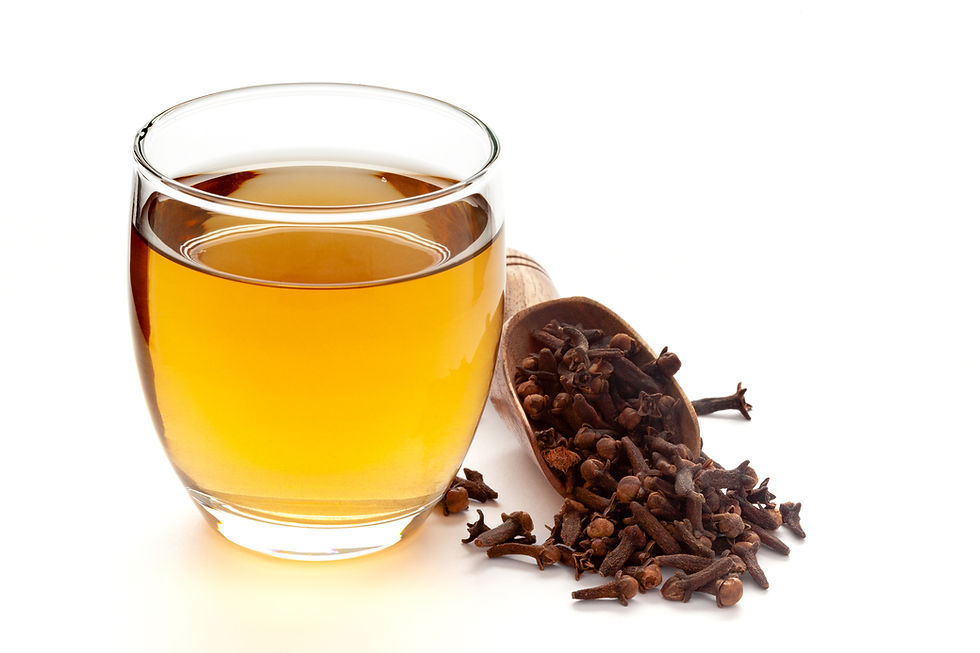Clove Water and Women’s Health: Myths and Facts
- Herbs around us
- Sep 24, 2025
- 3 min read
Updated: Nov 10, 2025
Introduction
Across wellness forums and social media, clove water has been praised as a natural remedy for everything from skin glow to menstrual comfort. Many women are curious: Is clove water truly a health booster, or is it just another internet trend?
This article takes a closer look at how clove water may affect women’s health—sorting real benefits from myths, while highlighting safety considerations.

What Is Clove Water?
Clove water is a mild herbal infusion made by soaking a few whole cloves in water for several hours, usually overnight. Unlike concentrated clove oil, it delivers a subtle dose of bioactive compounds such as eugenol, flavonoids, and antioxidants.
Because it’s gentle, clove water has become a daily habit for some women seeking natural wellness support.
Claimed Benefits for Women – Sorting Myths from Facts
Myth or Fact: Clove Water Eases Menstrual Cramps
Fact, but with limits. Eugenol, the main compound in cloves, has mild analgesic properties. A 2021 PubMed review noted that clove extracts may reduce uterine contractions in animal studies. Some women report less bloating and discomfort when drinking clove water during their cycle.
But: Research in humans is limited. It may offer mild relief, but it’s not a substitute for medical treatments.
Myth or Fact: Clove Water Improves Fertility
Myth (so far). No clinical studies prove that clove water boosts fertility. While cloves contain antioxidants that support general reproductive health, claims about increasing fertility are not scientifically established.
Myth or Fact: Clove Water Supports Bone Health in Women
Partially fact. An NIH-funded study (2020) suggested that clove compounds could support bone density in postmenopausal models. Antioxidants and phytonutrients may help reduce oxidative stress linked to bone loss.
But: No large-scale trials confirm direct benefits for women’s bone health yet.
Myth or Fact: Clove Water Brightens Skin
Partially fact. Antioxidants in cloves help reduce oxidative damage, which can influence skin health. Some women notice clearer skin with regular use.
But: Results vary, and there’s no scientific consensus that clove water is a skin treatment. Hydration itself may explain part of the effect.
Myth or Fact: Clove Water Helps With Weight Loss
Myth. Clove water does not directly burn fat. However, by supporting digestion and helping regulate blood sugar, it may indirectly reduce cravings. True weight management requires diet and exercise.
Potential Side Effects for Women
Even natural remedies carry risks. For women, daily clove water should be approached with caution in these cases:
Pregnancy: Small culinary amounts are safe, but daily clove water is not recommended due to potential uterine stimulation.
Breastfeeding: No reliable data exists on safety. Better to avoid.
Medication interactions: Cloves may increase bleeding risk if combined with anticoagulants.
Digestive issues: Too much clove water can cause nausea, stomach upset, or heartburn.
Best Ways for Women to Use Clove Water Safely
Moderation matters – Stick to 2–3 cloves in one glass of water per day.
Timing – Many women prefer drinking it in the morning for better digestion.
Cycle care – Some women find it helpful during menstruation to ease bloating.
Consult first – If pregnant, breastfeeding, or on medication, always consult a healthcare provider.
Everyday Alternatives for Women Who Don’t Like the Taste
Frequently Asked Questions
1. Is clove water safe for pregnant women?
Culinary use is safe, but clove water in daily amounts should be avoided during pregnancy without medical advice.
2. Can clove water balance hormones?
No scientific evidence supports hormone regulation, though antioxidants may support overall wellness.
3. How long does it take to see results from drinking clove water?
Some women notice digestive benefits within days, but most other claims lack strong scientific proof.
4. Is clove water safe for teenage girls?
In small amounts, yes, but avoid daily use for children or teens without medical supervision.
Conclusion
Clove water has earned attention as a natural wellness trend among women, but many claims are exaggerated. While it may offer mild relief from bloating, digestive discomfort, and provide antioxidant support, it is not a miracle cure for fertility, weight loss, or hormone balance.
For most women, drinking clove water in moderation is safe and may provide gentle wellness benefits. But safety during pregnancy, medication use, and long-term effects should not be overlooked.
When used wisely, clove water can complement, but never replace, professional medical care.
References
National Institutes of Health. Clove Compounds and Bone Health Study. 2020.
PubMed Central. “Analgesic and Uterine Effects of Clove Extracts.” 2021.
Harvard Health Publishing. “Spices and Their Role in Women’s Wellness.” 2023.
Mayo Clinic Proceedings. “Clove and Antioxidant Health Impacts.” 2022.















